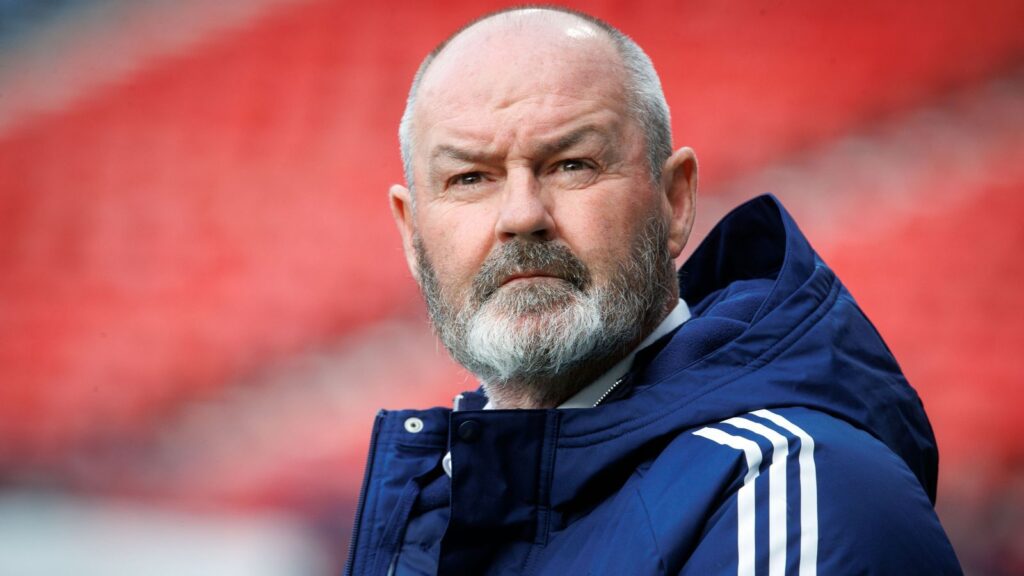Scotland head coach Steve Clarke has recalled four players to his squad for the decisive World Cup qualifiers against Greece and Denmark.
Falkirk goalkeeper Scott Bain – who made the last of his three appearances for the national side in March 2019 against San Marino – is included in place of No 1 Angus Gunn.
Nottingham Forest’s Gunn – who had started all of Scotland’s four previous qualifiers – has suffered a knee ligament injury, with Craig Gordon, 42, and Rangers’ Liam Kelly the other goalkeeping options for Clarke.
At the other end of the pitch, Gordon’s Hearts team-mate Lawrence Shankland returns in place of Hibernian forward Kieron Bowie.
Shankland has scored three goals in his last three games, taking his tally to seven for the season, helping fire Hearts to the top of the Scottish Premiership.
Elsewhere, Clarke has added to his defensive options by recalling Sassuolo left-back Josh Doig and Bristol City’s Ross McCrorie in a larger 25-player squad.
With a World Cup play-off spot already secured, Clarke’s side head to Greece on November 15 before welcoming Group C leaders Denmark to Hampden Park three days later in a potential winner-takes-all clash.
Denmark have a better goal difference and face Belarus next, so Scotland will likely need to pick up at least a draw in Greece before beating Denmark at the national stadium if they’re to secure automatic qualification to the finals for the first time since 1998.
More to follow….
Scotland squad in full:
Goalkeepers: Scott Bain (Falkirk), Craig Gordon (Hearts), Liam Kelly (Rangers).
Defenders: Josh Doig (Sassuolo), Grant Hanley (Hibernian), Jack Hendry (Al Etiffaq), Aaron Hickey (Brentford), Ross McCrorie (Bristol City), Scott McKenna (Dinamo Zagreb), Anthony Ralston (Celtic), Andy Robertson (Liverpool), John Souttar (Rangers), Kieran Tierney (Celtic).
Midfielders: Ryan Christie (Bournemouth), Lewis Ferguson (Bologna), Ben Gannon Doak (Bournemouth), Billy Gilmour (Napoli), John McGinn (Aston Villa), Kenny McLean (Norwich), Scott McTominay (Napoli), Lennon Miller (Udinese).
Forwards: Che Adams (Torino), Lyndon Dykes (Birmingham), George Hirst (Ipswich), Lawrence Shankland (Hearts).
From ‘head-scratcher’ to the brink of history
Scotland picked up four points from their opening two qualifiers, drawing away to top-seeds Denmark, before beating Belarus 2-0 to end September joint-top of the table.
Next up was a Hampden Park double header in which all six points were claimed.
Clarke’s side did it the hard way, as they came from behind to beat Greece 3-1, before a 2-1 win over Belarus helped secure a play-off spot.
That victory over Belarus saw Clarke take charge of a record-breaking 72nd game as national team boss, but afterwards he described the performance as a “head-scratcher”, before adding it was “possibly as disappointed as I’ve been over the whole 72 games”.
However, Clarke did promise “a different animal” for these final two games against the already eliminated Greece and group leaders Denmark.
A play-off spot is secured, but two more wins will seal a return to the World Cup for the first time since 1998. Scotland and Clarke are on the brink of making history.
Scotland’s final World Cup qualifiers
- Greece (A) – November 15
- Denmark (H) – November 18
World Cup 2026 European qualifiers schedule
- Final group-stage match dates: November 13-18, 2025
- Play-off match dates: March 26-31 2026
- Final tournament dates: June 11 to July 19 2026
How many European teams will qualify?
In total, 16 UEFA nations will qualify for the 2026 World Cup. The 12 group winners qualify directly for the World Cup; the four remaining berths are determined by play-offs involving the 12 group runners-up.
How do play-offs work?
The 12 group runners-up will participate in the play-offs, along with the four best-ranked group winners of the 2024/25 UEFA Nations League that did not finish their European Qualifiers group stage in first or second place.
The 16 teams that enter the play-offs will be drawn into four play-off paths, with four teams in each. Play-off matches will be played in single-leg semi-finals, followed by single-leg finals within the same international window in from March 26 to 31 next year.
When and where is the 2026 World Cup?
The 2026 FIFA men’s World Cup takes place from June 11 to July 19, 2026.
The tournament will take place across 16 cities in three North American countries: the United States, Canada and Mexico. It is the first time a World Cup has been hosted by three nations.
The last time North America hosted the tournament was in 1994, when Brazil triumphed after beating Italy on penalties.
An expanded World Cup will feature 48 teams – 16 more than in Qatar 2022 – and take place across three host nations for the first time.
World Cup 2026 schedule
Group stage: June 11-27
Round of 32: June 28 to July 3
Round of 16: July 4-7
Quarter-finals: July 9-11
Semi-finals: July 14-15
Third-place play-off (‘Bronze final’): July 18
Final: July 19




